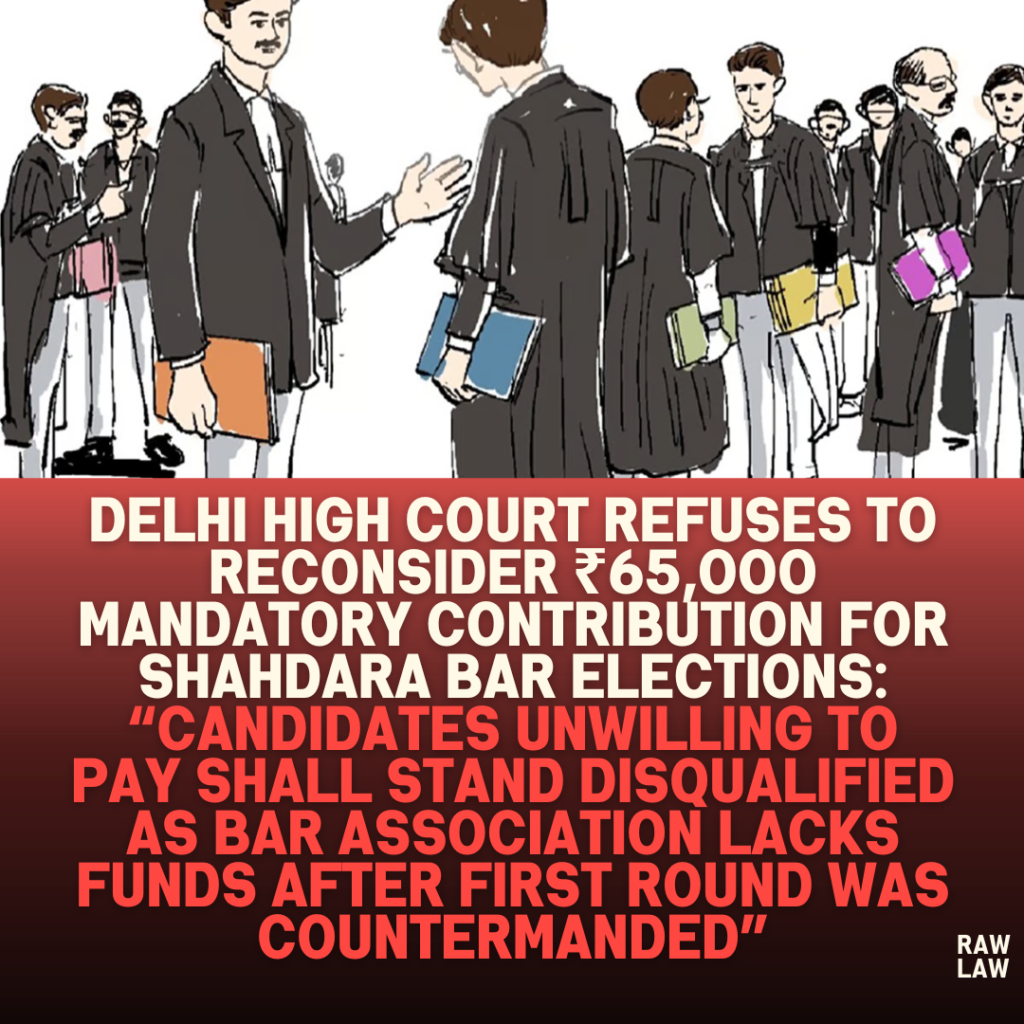Court’s Decision
The Delhi High Court dismissed an application challenging its earlier order mandating a ₹65,000 contribution from each candidate contesting the Shahdara Bar Association elections. The Court held:
“The candidates who are not willing to deposit the money shall stand disqualified from contesting the elections.”
It refused to revisit the earlier order dated 8th May 2025, observing that directions were issued in open court and with general consensus.
Facts
- The Delhi High Court was seized of a writ petition concerning the conduct of elections to Bar Associations across Delhi.
- While elections were successfully conducted on 21st March 2025 for most Bar Associations, elections in Shahdara and Saket were postponed.
- The Shahdara Bar Association elections were rescheduled to 24th May 2025 after the initial round was countermanded due to irregularities.
- Due to a lack of funds, the Election Committee, chaired by Justice Talwant Singh (Retd.), proposed that each candidate contribute ₹65,000 towards the estimated ₹25 lakh election expenses.
Issues
- Whether the mandatory contribution of ₹65,000 by each contesting candidate is valid and can be enforced.
- Whether the Court should permit candidates to contest without paying the said amount.
- Whether elections could be conducted using paper ballots instead of Electronic Voting Machines (EVMs).
Petitioner’s Arguments
- The Applicants sought exemption from paying the ₹65,000 contribution.
- They requested that the elections be conducted using Shahdara Bar Association’s funds.
- They further submitted that elections should be conducted via personal ballots, in accordance with Rule 5(ii) of the Bar Council of Delhi Rules, 1963.
- They contended that they had not been present during the hearing on 8th May 2025 and had not consented to the mandatory payment.
Respondent’s Arguments
- Counsel for the Chairperson of the Election Committee submitted that the direction to contribute ₹65,000 was necessitated by lack of funds, as the Association only had ₹3 lakhs available.
- Of the 38 candidates, 28 had already paid the amount, aggregating to ₹21.87 lakhs.
- The estimated cost of conducting the election was over ₹25 lakhs, and paper ballot elections would be more complex and expensive than using EVMs.
- It was clarified that the directions had been issued after hearing all concerned parties, including many candidates who were present in person or virtually.
Analysis of the Law
The Court considered the financial exigencies highlighted by the Chairperson and held that the candidates’ contribution was essential for conducting the elections. It emphasized that the absence of funds after the first failed round made such directions unavoidable.
Precedent Analysis
There was no specific precedent cited in the judgment. The Court exercised its jurisdiction in equity and practicality based on the facts and circumstances surrounding the Shahdara Bar elections.
Court’s Reasoning
- The Court noted that its earlier direction came after hearing several stakeholders and with broad consensus.
- The Court found that “no objection was raised by anyone” regarding the payment direction at the time.
- The absence of the three Applicants on the previous date did not render the order invalid.
- The Court found no merit in revisiting the order, especially when the majority of candidates had complied and deposited the amount.
Conclusion
The application seeking exemption from depositing the ₹65,000 was dismissed. The Court reiterated that:
“Candidates who are not willing to deposit the money shall stand disqualified from contesting the elections to the Shahdara Bar Association.”
Implications
This decision reaffirms the Court’s authority to issue directions necessary for the fair and feasible conduct of Bar Association elections, especially when financial constraints exist. It sets a precedent for upholding collective responsibility among candidates and refusing relief to those attempting to bypass financial obligations crucial to the electoral process.
